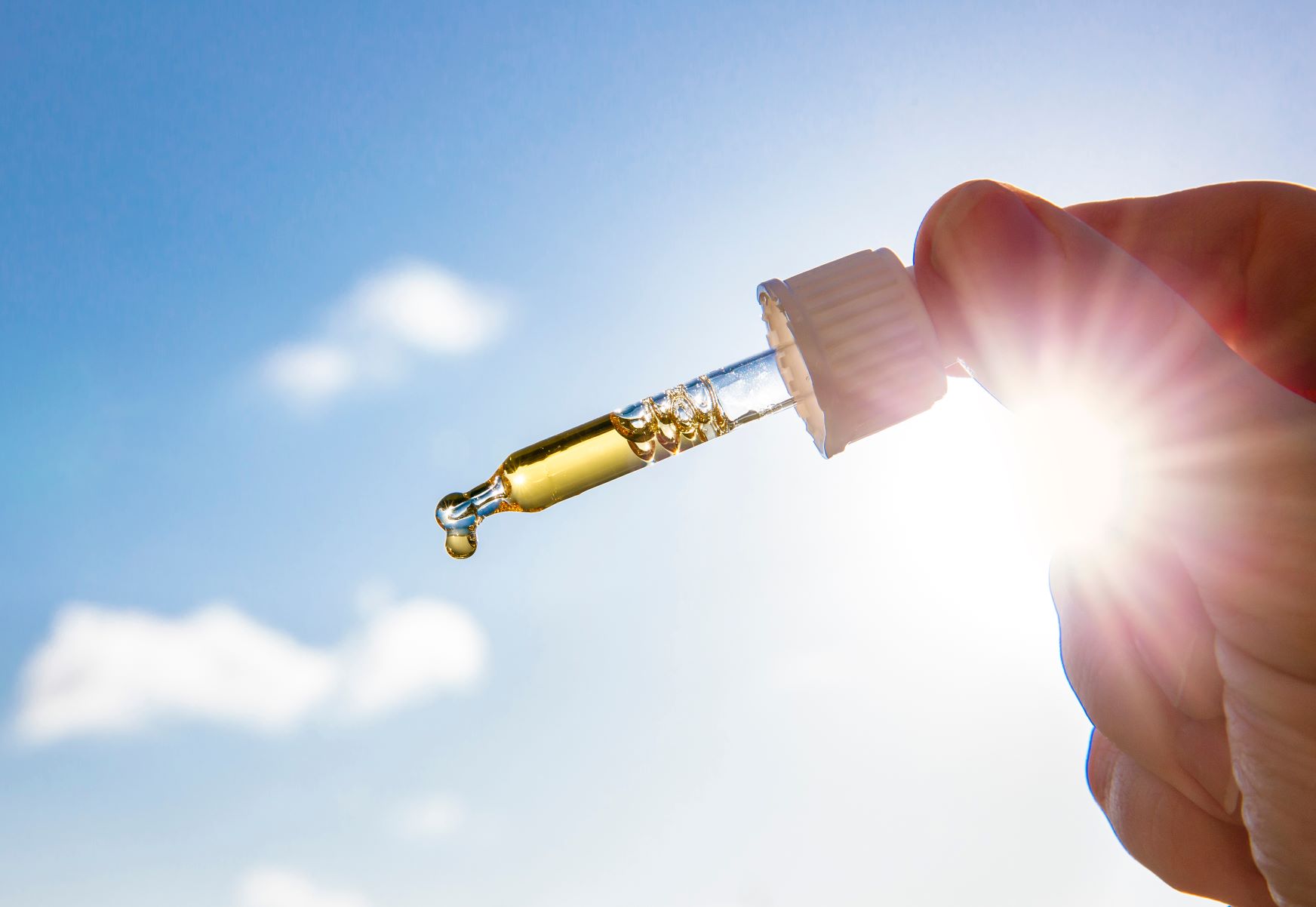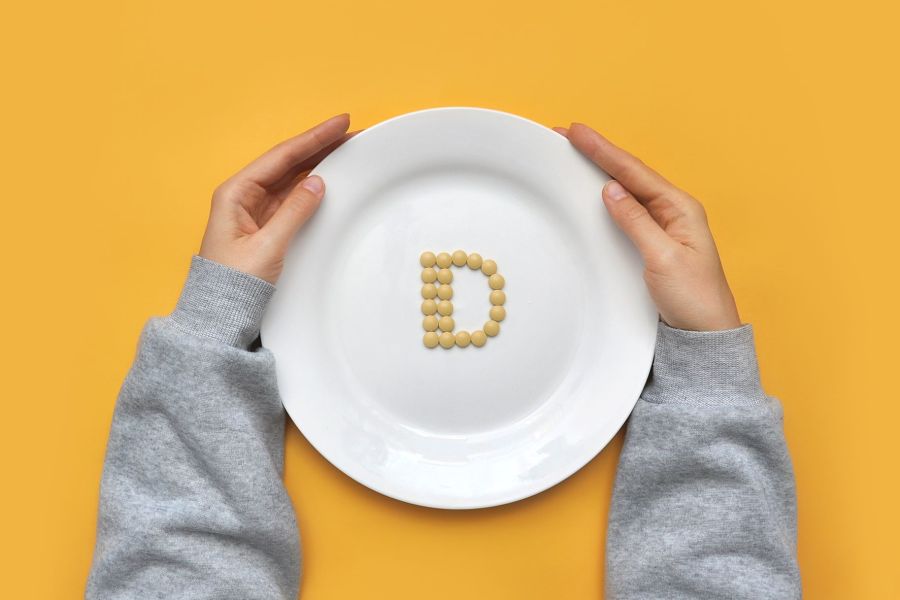Vitamin D offers numerous health benefits – not least of which could be some form of protection from Covid-19. It’s a hot topic of scientific debate, yet at least one-in-five people don’t get enough of this essential micronutrient. Here’s the inside story on the sunshine supplement, plus some top tips on how to increase your vitamin D levels naturally…
By Angela Kennedy
Everyone knows you need a good balance of vitamins and minerals in your diet to maintain optimum health. Micronutrient vitamin D is one such health-boosting essential that’s vital for strong bones, as it aids absorption of calcium in your gut. So, getting enough is especially important to prevent bone density loss and osteoporosis.
However, not everyone might know it’s difficult to get enough vitamin D solely from the sun or your diet. Our skin produces vitamin D when exposed to sunlight, but there’s not enough during colder months, so the NHS advises taking a 10 microgram (mcg) supplement between the months of October and March. No wonder at least one-in-five of us are deficient in this sunshine vitamin.
What is vitamin D?
Vitamin D is better described as a steroid hormone than a vitamin, because your body can make it naturally – as opposed to most other vitamins, which you can’t make but get through your diet. ‘Vitamin D is set apart from other vitamins, partly because we weren’t designed to get it from food,’ says Professor Adrian Martineau of Queen Mary University of London, a leading expert on the effects of vitamin D on human health. ‘We are meant to make it via sunshine. Your skin contains a type of cholesterol precursor to vitamin D, which ultraviolet light converts into D3. It then enters your bloodstream and the liver processes it.’
Am I deficient in vitamin D?
While our bodies should naturally produce vitamin D, they can’t always in winter. The true total of people deficient in vitamin D may be far higher than the previously stated one in five. This is because minimum levels are not internationally agreed. ‘The Department of Health defines deficiency as blood levels below 25 nanomoles per litre (nmol/L). But that’s a very conservative figure. I’m not aware of any other country using such a low level,’ says Professor Martineau.
‘Most countries define it as below 50 nmol/L – double the UK figure. While the Endocrine Society in the US defines sufficiency as 75 nmol/L. So, the UK’s one-in-five deficiency figure rises to about 40-50 per cent of people deficient at the more wide internationally accepted 50 nmol/L level.’

How much vitamin D should I get per day?
So, if a supplement is one of the only ways to boost your intake of vitamin D, how much should you take? Although experts currently recommend 10 mcg per day, government guidance states taking up to 100 mcg per day as safe – but you mustn’t exceed this. It comes in two forms: D2 (ergocalciferol) from plants, such as mushrooms and other fungi, and D3 (cholecalciferol) from sunshine and animal sources, such as oily fish and eggs.
Vitamin D3 is the preferred version as it remains in your body for longer and is easier to process. But you can find vitamin D3 supplements made from the fungus lichen, which are suitable for vegans (see product panel). It’s also worth noting that your ability to make vitamin D declines with age. After 65, you make just a quarter of the vitamin D made during your 20s. But the good news is that we can easily absorb this fat-soluble vitamin in supplement form.
Can vitamin D help to protect against Covid?
There’s also growing evidence that vitamin D not only boosts bone strength, but protects against respiratory infections, such as the common cold, flu and other respiratory viruses. Following an analysis by Professor Martineau and colleagues of 42 clinical trials on vitamin D, they found that a daily dose of between 10 mcg and 25 mcg could protect against respiratory tract infection. Good news for everyone, but especially for asthmatics, who may have more severe symptoms when infected with a respiratory virus.
It’s for this reason that Professor Martineau and the team launched one of the world’s first clinical trials to find out whether vitamin D offers protection against Covid-19. ‘The Coronavit trial will run for six months, testing 6,200 people to find out whether vitamin D can reduce risk or severity of Covid-19. We are comparing doses of 20 mcg and 80 mcg with the government-recommended 10 mcg daily.
‘Many observational studies have linked lower vitamin D levels to Covid-19 increased risk or worse outcomes. But these don’t prove a cause-and-effect relationship. The only way to prove or disprove that is with a clinical trial,’ says Professor Martineau.
Further benefits of vitamin D
Reducing chronic inflammation in your body is another big benefit of vitamin D, according to a wide-ranging analysis published in the International Journal of Molecular Sciences. It suggests the vitamin can dampen down inflammatory responses in your immune system. This is important because chronic inflammation is linked to many illnesses, such as cancer, heart disease, diabetes and autoimmune diseases, as well as neurodegenerative diseases, such as Alzheimer’s or Parkinson’s.
The vitamin may also boost mental health as several studies have found vitamin D supplementation to ease major depression in some people. Of course, the science behind vitamin D is constantly evolving. New studies will bolster its benefits or unpick them. While the science unfolds, think of vitamin D as an extremely useful tool for boosting your immune system and maintaining good health.

5 best sources of vitamin D to boot your intake
Registered dietitian, Lucy Perrow, of the British Dietetic Association, shares some of her tips for increasing your levels of vitamin D…
Sunlight
We can’t find vitamin D in many foods, so experts recommend you get at least five-to-30 minutes of sun exposure daily. This means sunlight on hands, arms, legs or face while uncovered by clothes or sunscreen. But it’s a balancing act, because too much sun exposure can increase risk of skin cancer, so do limit your sun exposure to the stated times.
However, in the UK, you can’t usually get enough sunlight between October and March. So around early spring is when most people are most deficient in the vitamin, having gone all winter with lack of UVB. This means experts recommend taking a vitamin D supplement of 10 mcg per day. Year-round supplementation is important for people with darker skin tones as less UV light can penetrate into deeper layers of skin, where your body makes vitamin D.
Oily fish
Because vitamin D is a fat-soluble vitamin, we tend to find it in fatty or oily foods. About one large fillet or 140 grams of fish, such as salmon or mackerel, would approximately provide the recommended intake. Or one teaspoon of cod liver oil contains about 34 mcg.
Mushrooms
When grown in UV light these are a great veggie and vegan way to get vitamin D from food. About two Portobello mushrooms, four chestnut mushrooms or 14 button mushrooms would provide your daily allowance. The UV-light mushrooms are widely available in supermarkets –likely to be labelled as ‘high in vitamin D’ or ‘vitamin enriched’ on the packaging.
Eggs
These are a good source of vitamin D, but you’d have to eat six-to-10 per day to meet your recommended daily dose! Instead, include them regularly in your diet to count towards your vitamin D intake.
Cereals
Many breakfast cereals are fortified with vitamin D. A 30g serving provides about 1.5 mcg. So, this counts towards your daily intake. Some brands of soy, almond, oat or cow’s milk have vitamin D added to them, so check the label.

4 of the best vitamin D supplements

High Nature Vitamin D3 spray (£9.99) is an oral spray that houses the active form of vitamin D that’s easily absorbed by your body. Two sprays in the mouth daily and you’ll get all the vitamin D you need.

Wild Earth Vitamin D3 (£8.99 for 30) is sourced from lichen, so it is suitable for vegans. Combined with nutrient-dense spirulina and green banana flour for gut health, it packs a nourishing punch. Even the packaging, including the blister pack, is compostable and biodegradable.

HuxD3 (£7.99 for 30) contains 500 mcg of vitamin D3 per pill, and it’s recommended you take one capsule every two weeks. Always check with your doctor before taking a high-strength supplement.

Vitamin Injections London VitaminD3 Skin Patches (£49.99 for a month’s supply) are adhesive skin patches that help you absorb vitamin D3 through your skin straight into your bloodstream. In a similar way to HRT patches, the medical-grade patch releases vitamin D slowly, over about 12 to 24 hours. They contain 125 mcg of the vitamin from cod liver oil extract.







